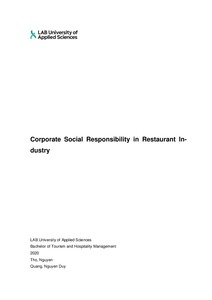Corporate Social Responsibility in Restaurant Industry
Nguyen, Duy Quang; Nguyen, Tho (2020)
Nguyen, Duy Quang
Nguyen, Tho
2020
All rights reserved. This publication is copyrighted. You may download, display and print it for Your own personal use. Commercial use is prohibited.
Julkaisun pysyvä osoite on
https://urn.fi/URN:NBN:fi:amk-2020120826922
https://urn.fi/URN:NBN:fi:amk-2020120826922
Tiivistelmä
The objectives of the study were to promote sustainability, encourage people to act
proactively toward global issues and raise people awareness of social and environmental responsibility. The study was compiled by two enthusiastic students Tho Nguyen and Quang Nguyen Duy.
Empirical part of the study was meant to discover which issues the local community
concerns the most. The method of the study was quantitative research. Data for the
study were collected online via Lappeenranta local groups. There were three hundred
respondents including international students, temporary residents and native citizens
from different professions and age groups after two weeks of questionnaire distribution.
Based on the findings, people appreciate good food quality, human right and equality
concerns the most as compared to the three least- valued restaurant’s actions addressing dietary health problems, carbon emission and the wellbeing of local people.
The results can be applied to not only restaurant industry, but also other industries as
a reference.
proactively toward global issues and raise people awareness of social and environmental responsibility. The study was compiled by two enthusiastic students Tho Nguyen and Quang Nguyen Duy.
Empirical part of the study was meant to discover which issues the local community
concerns the most. The method of the study was quantitative research. Data for the
study were collected online via Lappeenranta local groups. There were three hundred
respondents including international students, temporary residents and native citizens
from different professions and age groups after two weeks of questionnaire distribution.
Based on the findings, people appreciate good food quality, human right and equality
concerns the most as compared to the three least- valued restaurant’s actions addressing dietary health problems, carbon emission and the wellbeing of local people.
The results can be applied to not only restaurant industry, but also other industries as
a reference.
